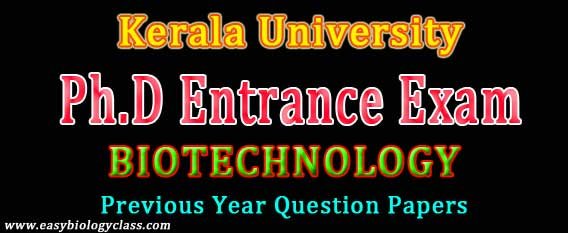
KERALA UNIVERSITY Ph.D. ENTRANCE EXAMINATION – 2013
FACULTY OF APPLIED SCIENCES
BIOTECHNOLOGY
Time: 140 Minutes Maximum Marks: 160
Note: Answer any twelve questions from Section B and one question from Section C in the subject concerned. In Section B, each question carries 10 marks. Section C carries 40 marks. In Section B an answer should not exceed 100 words. In Section C, an answer should not exceed 500 words.
SECTION – B
(1). What is Ramachandran plot? Describe the structural details and principles based on which Ramachandran plots are constructed. Add a note on its applications.
(2). Phage derived vectors and artificial chromosomes are preferred rather than plasmids for constructing genomic libraries of eukaryotes. Explain.
(3). Explain the molecular mechanisms by which Ti plasmid of Agrobacterium tumefacience is transferred to the plants causing tumour.
(4). Compare the following :
a. Eukaryotic and prokaryotic promoters
b. Eukaryotic and prokaryotic ribosomes
c. Eukaryotic and prokaryotic RNA polymerases
d. Eukaryotic and prokaryotic DNA polymerases
(5). Explain a theoretical background of pulse field electrophoresis.
(6). Write brief notes on any two of the following:
a. Excitatory state
b. Facilitation of neurons
c. Temporal summation.
(7). In higher plants, the red/far-red sensory photoreceptor, phytochrome, is a lightregulated kinase. Explain its role in metabolism.
(8). Give a brief outline about the immune system and various cells involved in immune response.
(9). What are the different types of neurons? State Waldeyer’s neuron theory and describe the structure of a typical neuron.
(10). What are the different types of ion channels? Devise an immune fluorescent method to distinguish them.
(11). Which are the major ecosystems in the world? Write a comparative account of them with reference to their productivity, biodiversity, energy flow, and food chain and tropic levels.
(12). Discuss the technique for the production of monoclonal antibodies and its various applications in medical field.
(13). A monoclonal antibody binds to G-actin but not to F-actin. What does it tell you about the epitope recognized by the antibody? Using this example, explain the use of antibodies to probe structure-function relationships in proteins.
(14). Describe the process of infection and pathogenesis in plants and explain the common strategies adopted to control plant diseases.
(15). Write a comparative account of the molecular events taking place in the 5’ – 3’ synthesis of RNA during transcription and the 5’ – 3’ synthesis of DNA during the replication of DNA.
(16). Write an account on the different methods of regulation of enzyme activity.
SECTION – C
(1). Give the general structure of Research Proposal. Give the general physicochemical Properties of Enzymes. Prepare a Research proposal for the isolation purification and molecular characterization of an enzyme from the chloroplast of a green plant.
(2). Prepare a sample project proposal on a biological problem having industrial application for submission to University Grants Commission.
(3). You are conducting a research work as a part of a project sponsored by a govt. funding agency, and is about to complete. Prepare a project completion report to submit to the funding agency, highlighting the important outcome of the project.
Download this Question Paper as PDF File
Download link is provided below the PDF Preview…
 Loading...
Loading...
Browse more in Easy Biology Class…
Lecture NotesBiology PPTsVideo TutorialsBiology MCQQuestion BankDifference betweenPractical AidsMock Tests (Online)Biology Exams
If you like this post, please COMMENT . . . . (below ↓)
Please Share with your Friends, Relatives, Students and Colleagues…
